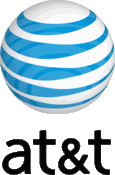|
AT&T
|
||
|
HOME | BIOLOGY | FILMS | GEOGRAPHY | HISTORY | INDEX | MUSIC | THE BOAT | SOLAR BOATS | SPONSORS |
||
|
AT&T Inc. (NYSE: T) is the largest provider of both local and long distance telephone services, wireless service, and DSL internet access in the United States. The current company, which is based in San Antonio, Texas, was formed in 2005 by SBC Communications' purchase of its former parent company, AT&T Corp. As a part of the merger, SBC shed its name and took on the iconic AT&T moniker (originally American Telephone and Telegraph) and the famed T stock-trading symbol (for "Telephone").
AT&T Corporation - History
AT&T Corp. provides voice, video, data, and Internet telecommunications and professional services to businesses, consumers, and government agencies. During its long history, AT&T has at times been the world's largest telephone company, the world's largest cable television operator, and a regulated monopoly.
At its peak, it employed one million people and its revenue was roughly $300 billion annually in today's dollars
(for comparison, Exxon's 2005 annual revenue was $371 billion). At the time of the merger with SBC, AT&T was headquartered in Bedminster, New Jersey.
The formation of the Bell Telephone Company superseded an agreement between Alexander Graham Bell and his financiers, principal among them Gardiner G. Hubbard and Thomas Sanders. Renamed the National Bell Telephone Company in March 1877, it became the American Bell Telephone Company in March 1880. By 1881, it had bought a controlling interest in the Western Electric Company from Western Union. Only three years earlier, Western Union had turned down Gardiner Hubbard's offer to sell it all rights to the telephone for $100,000.
In 1880, the management of American Bell, created what would become AT&T Long Lines. The project was the first of its kind to create nationwide long-distance network with a commercially viable cost-structure. This project was formally incorporated into a separate company christened American Telephone and Telegraph Company on March 3, 1885. Starting from New York the network reached Chicago, Illinois in 1892.
Bell's patent on the telephone expired in 1894, but the company's much larger customer base made its service much more valuable than alternatives and substantial growth continued.
On December 30, 1899, the American Telephone and Telegraph Company bought the assets of American Bell--this was because Massachusetts corporate laws were very restrictive and limited capitalization to ten million dollars, forestalling the growth of American Bell itself.
National long distance service reached San Francisco in 1915. Transatlantic services started in 1927 using two-way radio, but the first trans-Atlantic telephone cable did not arrive until 1956, with TAT-1.
National monopoly
As a result of a combination of regulatory actions by government and actions by AT&T, the firm eventually gained what most regard as monopoly status. In 1907, AT&T president Theodore Vail made it known that he was pursuing a goal of "One Policy, One System, Universal Service." AT&T began purchasing competitors, which attracted the attention of antitrust regulators. To avoid antitrust action, in a deal with the government, Vail agreed to the Kingsbury Commitment of 1913. The terms of the agreement allowed AT&T to purchase independent phone companies as long as it sold just as many. G.W. Brock says in Telephone:The First Hundred Years, "This provision allowed Bell and the independents to exchange telephones in order to give each other geographical monopolies. So long as only one company served a given geographical area there was little reason to expect price competition to take place." AT&T focused on purchasing companies within specific geographic areas while selling its other previously acquired companies to independent buyers. Also included in the Kingsbury Commitment was the requirement that AT&T allow competitors to connect through its phone lines. Economists point out that this reduced the incentive of these companies to build competing long-distance lines.
Around 1917, the idea that everyone in the country should have phone service and that the government should promote that began being discussed in government. AT&T agreed, saying in a 1917 annual report: "A combination of like activities under proper control and regulation, the service to the public would be better, more progressive, efficient, and economical than competitive systems." In 1918 the federal government nationalized the entire telecommmunications industry, with national security as the stated intent. Rates were regulated so that customers in large cities would pay higher rates to subsidize those in more remote areas. Vail was appointed to manage the telephone system with AT&T being paid a percentage of the telephone revenues. AT&T profited well from the nationalization arrangement which ended a year later. States then began regulating rates so that those in rural area would not have to pay high prices, and competition was highly regulated or prohibited in local markets. Also, potential competitors were forbidden from installing new lines to compete, with state governments wishing to avoid "duplication." The claim was that telephoning was a "natural monopoly," meaning that one firm can better serve the public than two or more. Eventually, AT&T's market share amounted to a what most regard as monopoly.
LINKS and REFERENCES:
Mobile refreshment for better communicators ......
330ml Earth Can - the World in Your Hands
|
||
|
This
website
is Copyright © 1999 & 2007 NJK. The bird |
||
|
AUTOMOTIVE | BLUEBIRD | ELECTRIC CARS | ELECTRIC CYCLES | SOLAR CARS |

